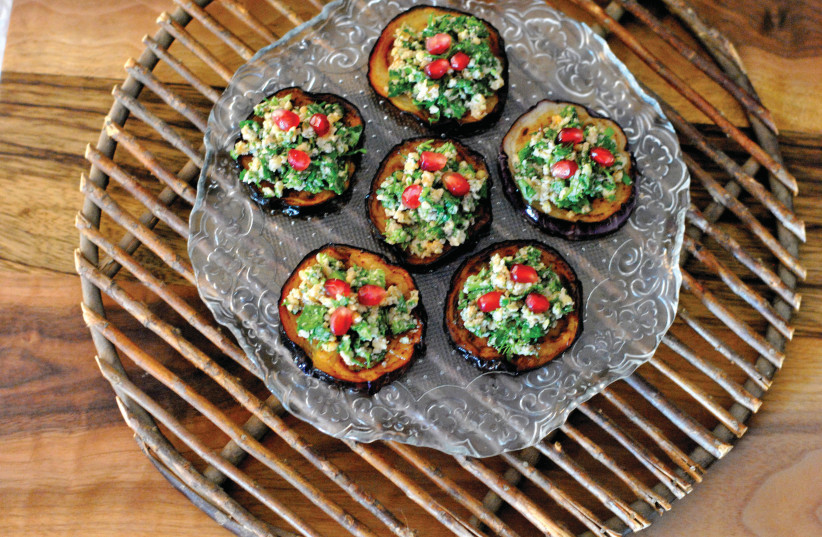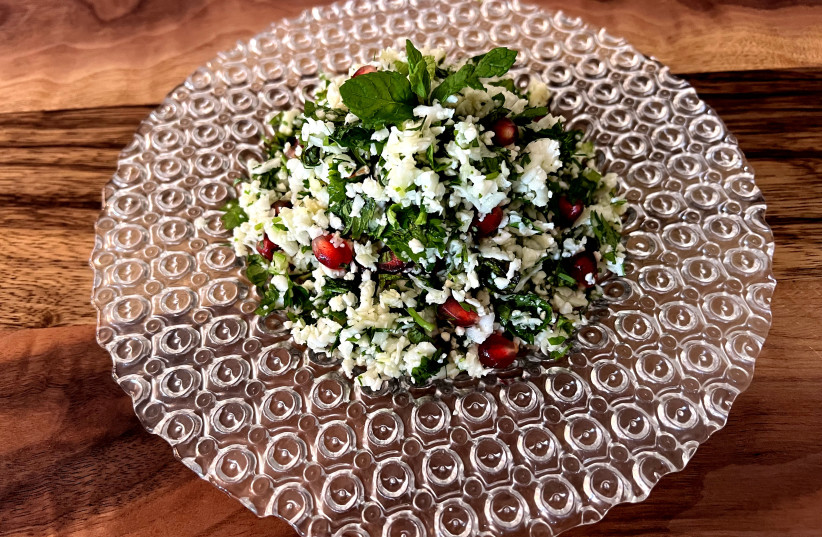For many years, Israeli farmers have been bemoaning the fact that the agriculture industry is in a state of crisis. Even before the war, local farmers were barely making a living. Time and again, they’ve warned that no country can survive without local agriculture.
Our roots are deeply planted in the soil of our land, and our land is the source of our sustenance. The government made a terrible mistake when it lowered tariffs on cheaper imported produce from Turkey. With that in mind, I went to the farmers’ market in Ra’anana and picked out some choice blue-and-white produce, which I used in this week’s recipes.
Now Israel is finally waking up to the existential importance of its food security and is realizing that importing fruits and vegetables, and thereby becoming dependent on others, poses a huge threat.
With many of the foreign laborers having returned to their home countries due to the Israel-Hamas war, the fields remain full of produce with no one to harvest it. And so thousands of Israelis have volunteered to pick, pack, and sort fruits and vegetables so that this beautiful produce can reach customers, and farmers will have the funds necessary to plant next year’s crops.
This week, I am bringing you recipes for dishes utilizing blue-and-white produce.

GEORGIAN EGGPLANT SALAD WITH WALNUTS (Nigvziani Badrijani)
Makes 6-8 servings.
- 2 large eggplants
- Salt for sprinkling on eggplants
- Oil for frying
Nut mixture:
- 1 cup walnuts, chopped
- ½ cup parsley, chopped
- ½ cup cilantro, chopped
- ½ cup scallions, chopped
- ½ cup dill, finely chopped
- ½ cup celery stalks, chopped
- 1 small spicy green pepper, chopped
- 2 Tbsp. vinegar
- 5 cloves of garlic, crushed
- Salt, to taste
- Seeds from 1 pomegranate
Slice the eggplant into 2-cm.-thick slices, and arrange them on a platter. Sprinkle a generous amount of salt on them, then let them sit for 30 minutes. Wipe off the resulting liquid.
Heat enough oil in a frying pan, as if you were going to fry schnitzel. Fry the eggplant slices on both sides until they turn golden brown. Remove them, and place them on paper towels. Alternatively, if you don’t want to fry the eggplant slices, bake them in the oven until they turn golden brown and have softened. Arrange the cooked slices on a serving plate.
In a separate bowl, mix all the nut mixture ingredients together, except for the pomegranate seeds. Place a spoonful of the mixture in the center of each eggplant slice. Then add a few pomegranate seeds. Place in the fridge for an hour before serving so that the flavors can deepen.
- Level of difficulty: Easy
- Time: 1 hour
- Status: Parve
SMASHED POTATOES
Makes 6-8 servings.
- 6-8 medium potatoes
- 1 Tbsp. salt
- ¼-½ cup olive oil
- Salt and pepper, to taste
- ½ Tbsp. sumac or 5 thyme leaves
Boil the potatoes whole in their skins in a pot of salted water for 30-40 minutes until they’ve softened. Drain, and then smash them down gently with your palm.
Line a pan with baking paper, and place the potatoes on it. Sprinkle some salt and pepper on top of them, and drizzle some olive oil on them. Add the sumac or thyme leaves.
Bake the potatoes in an oven preheated to 200° for 25-30 minutes until they’ve browned nicely. Remove and serve hot.
- Level of difficulty: Easy
- Time: 65 minutes
- Status: Parve
OVEN-ROASTED CAULIFLOWER
Makes 6-8 servings.
- 1 large cauliflower, separated into florets
- 1 head of garlic
- 4-5 Tbsp. olive oil
- Salt and pepper, to taste
Dressing:
- Juice and zest from 1 large lemon
- 2 Tbsp. olive oil
- 2-3 Tbsp. mint or cilantro, chopped
- 1 tsp. mustard
- ½ tsp. cumin
- ½ tsp. chili powder
- Salt and pepper, to taste
Arrange the cauliflower florets in a pan that is covered with baking paper. Separate the garlic cloves, then smash them on the flat side, remove the skins, and scatter them in the pan with the cauliflower. Drizzle the olive oil on top, and sprinkle with salt and pepper.
Place the pan in an oven that has been preheated to 200° and bake for 25-30 minutes until the cauliflower has softened, making sure not to overcook them.
Prepare the salad dressing, then add 2 or 3 of the cooked garlic cloves to the dressing and shake well. Pour over the cauliflower and serve.
- Level of difficulty: Easy
- Time: 1 hour
- Status: Parve

CAULIFLOWER TABOULEH
Makes 6 servings.
- 1 cauliflower, separated into florets
- ½ cup pomegranate seeds
- Juice from ½ lemon
- 2 Tbsp. olive oil
- ½ bunch of mint, finely chopped
- 1/4 bunch of parsley, finely chopped
- 1/4 bunch of cilantro, finely chopped
- Salt and pepper, to taste
Blend the cauliflower pieces in a food processor until they are coarsely ground or smooth, according to your taste.
Transfer the cauliflower mixture to a bowl, then add the rest of the ingredients. Mix well, then taste and adjust the seasoning.
Serve cold.
- Level of difficulty: Easy
- Time: 1 hour
- Status: Parve
Translated by Hannah Hochner.